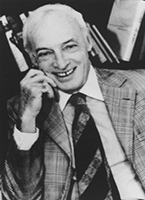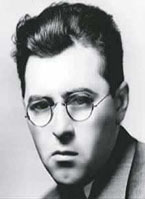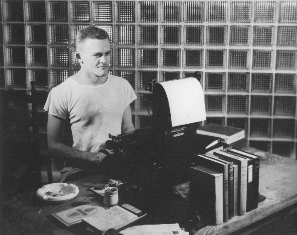
Mortimer Adler
Born: December 28, 1902 in New York, New York
Died: June 28, 2001 in Palo Alto Pen Name: None Connection to Illinois: Adler worked in Chicago from 1923 through 1952. He was the first 'non-lawyer' to join the Chicago law school faculty, as a professor of the philosophy of law. He studied philosophy at Columbia University in Chicago, Illinois Biography: Mortimer Adler was an American philosopher known for his book-length essays about reading, language, thought and knowledge. He was born in New York City and currently lives in Chicago. After studying and teaching in New York in the 1920's, he was a professor at the University of Chicago. During his life, he has been an editor, author and essayist. He was the Director for the Institute for Philosophical Research and the Chariman of the Board of Editors, Encyclopedia Britannica, both in Chicago.
Awards:
- -- Aquinas Medal from the American Catholic Philosophical Association
Selected Titles
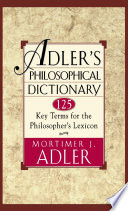 |
Adler's philosophical dictionary ISBN: 9781439105665 OCLC: 974211053 Covering a wide variety of philosophical disciplines Adler gives precise definitions of key terms such as chance, choice, duty, good, evil, honour, human nature, memory, time, soul and will & sheds light on how they have been interpreted, used or abused. |
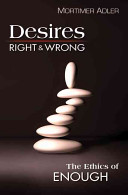 |
Desires, right and wrong : ISBN: 9781604190465 OCLC: 742512058 Axios Press, Mount Jackson, VA : [2012] What is 'moral' in the modern age? What is truly 'ethical'? Adler skillfully separates 'real' good from 'apparent' good, and shows how excesses--like gluttony, or the lust for power--simply mistake the means for the ends. Drawing on the entire Western philosophical tradition from Plato to Kant, Desires, Right & Wrong: The Ethics of Enough tackles some of the thorniest ethical problems facing the world today and suggests approaches that might help solve them. Adler regards happiness not as an experiential state, but as a well-lived life which attains everything that is really good--and affirms Aristotle's view of the obligations that individuals and societies owe toward justice and love. Clear and straightforward, with concrete examples, this book is for everyone, not just the philosophy student.--Page 4 of cover. |
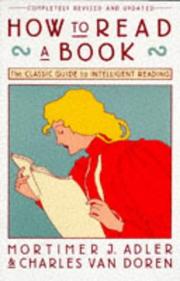 |
How to read a book / ISBN: 0671212095 OCLC: 410780 Investigates the art of reading by examining each aspect of reading, problems encountered, and tells how to combat them. |
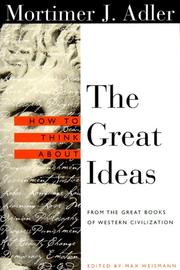 |
How to think about the great ideas : ISBN: 0812694120 OCLC: 680284007 Open Court, Chicago, Ill. : ©2000. Time magazine called Mortimer J. Adler a philosopher for everyman. In this guide to considering the big questions, Adler addresses the topics all men and women ponder in the course of life, such as What is love?, How do we decide the right thing to do?, and, What does it mean to be good? Drawing on his extensive knowledge of Western literature, history, and philosophy, the author considers what is meant by democracy, law, emotion, language, truth, and other abstract concepts in light of more than two millennia of Western civilization and discours. |
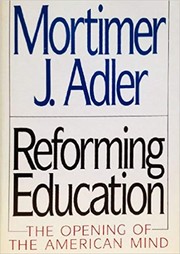 |
Reforming education : ISBN: 0025005510 OCLC: 18442397 Macmillan ; New York : ©1988. |
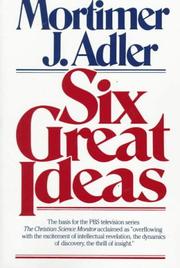 |
Six great ideas : ISBN: 068482681X OCLC: 38286604 Simon & Schuster, New York : 1997, ©1981. Discusses complex philosophical problems in concrete language to better understand the eternal concepts that shaped Western culture. |
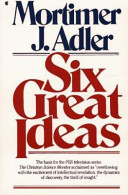 |
Six great ideas : ISBN: 0020720203 OCLC: 9945313 Collier Books ; New York : 1984, ©1981. Discusses complex philosophical problems in concrete language to better understand the eternal concepts that shaped Western culture. |
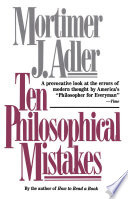 |
Ten philosophical mistakes ISBN: 9781439105061 OCLC: 892057069 An illuminating critique of modern thought from America's Philosopher for Everyman (Time). Ten Philosophical Mistakes examines ten errors in modern thought and shows how they have led to serious consequences in our everyday lives. It teaches how they came about, how to avoid them, and how to counter their negative effects. |
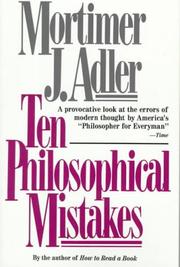 |
Ten philosophical mistakes / ISBN: 068481868X OCLC: 38540554 Touchstone, New York : 1996. |
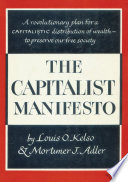 |
The Capitalist Manifesto. ISBN: 1787203514 OCLC: 985771884 Hauraki Publishing, 2017. In 1956, a U.S. lawyer-economist, Louis O. Kelso, created the employee stock ownership plan (ESOP) to enable the employees of a closely held newspaper chain to buy out its retiring owners. Two years later, Kelso and his co-author, the philosopher Mortimer J. Adler, explained the macro-economic theory on which the ESOP is based in this best-selling book, The Capitalist Manifesto. When you read this book, you must be prepared for a shock particularly if you are among the millions of Americans who feel complacent about the material well-being that now prevails in this country. THE CAPITALIST MANIFESTO will compel you to examine, reconsider and question many dangerous economic factors and political tendencies you have accepted as inevitable and will show you how you can do something about them. THE CAPITALIST MANIFESTO sets the alarm for all American citizens not simply one group or class. It is for stockholders, workers, labor leaders, corporation executives, investment bankers, taxpayers, small businessmen and industrialists, statesmen, legislators, judges and educators. Its purpose is to arouse us to the real and present dangers we now face, from inflation and from the progressive socialization of our economy. What is the difference between a well-heeled existence in a welfare state and the good life in a free society? THE CAPITALIST MANIFESTO will tell you what that difference is, and why you must be a man of property in order to be a free man. It will explain the meaning of your ever-expanding opportunities for leisure. It will tell you that the goal of an industrial society should not be full employment in the production of wealth, but full enjoyment of the wealth produced. It will tell you how you, as an individual, can best use wealth to further the happiness and well-being of yourself and your fellow men. A revolutionary force in human affairs offering still unplumbed promise for the future. Time Magazine. |
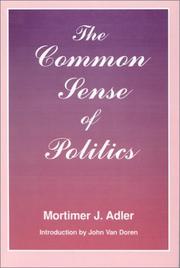 |
The common sense of politics ISBN: 0823216667 OCLC: 32969389 Fordham University Press, New York : 1996. |
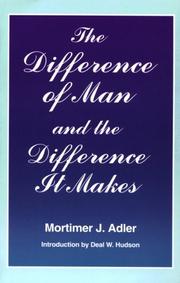 |
The difference of man and the difference it makes ISBN: 9780823215355 OCLC: 28421878 Fordham University Press, New York : 1993. Ultimately, Adler's work develops an approach to the separation between scientific and philosophical questions which stands as a model of philosophical consideration of new scientific discoveries and their consequences for the human person. |
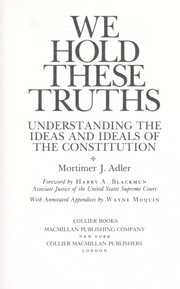 |
We hold these truths : ISBN: 0020641303 OCLC: 14241493 Macmillan ; New York : ©1987. Discusses the ideas at the core of the Declaration of Independence that form the ideals found in the Preamble to the Constitution. |


